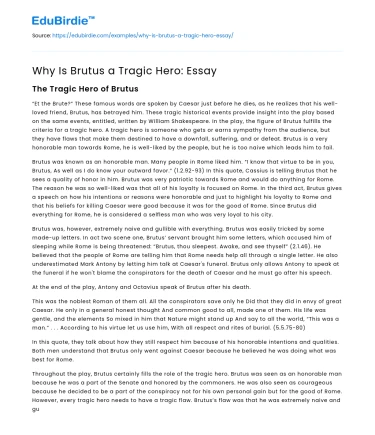The Tragic Hero of Brutus
“Et the Brute?” These famous words are spoken by Caesar just before he dies, as he realizes that his well-loved friend, Brutus, has betrayed him. These tragic historical events provide insight into the play based on the same events, entitled, written by William Shakespeare. In the play, the figure of Brutus fulfills the criteria for a tragic hero. A tragic hero is someone who gets or earns sympathy from the audience, but they have flaws that make them destined to have a downfall, suffering, and or defeat. Brutus is a very honorable man towards Rome, he is well-liked by the people, but he is too naive which leads him to fail.
Brutus was known as an honorable man. Many people in Rome liked him. “I know that virtue to be in you, Brutus, As well as I do know your outward favor.” (1.2.92-93) In this quote, Cassius is telling Brutus that he sees a quality of honor in him. Brutus was very patriotic towards Rome and would do anything for Rome. The reason he was so well-liked was that all of his loyalty is focused on Rome. In the third act, Brutus gives a speech on how his intentions or reasons were honorable and just to highlight his loyalty to Rome and that his beliefs for killing Caesar were good because it was for the good of Rome. Since Brutus did everything for Rome, he is considered a selfless man who was very loyal to his city.
Save your time!
We can take care of your essay
- Proper editing and formatting
- Free revision, title page, and bibliography
- Flexible prices and money-back guarantee
Brutus was, however, extremely naive and gullible with everything. Brutus was easily tricked by some made-up letters. In act two scene one, Brutus’ servant brought him some letters, which accused him of sleeping while Rome is being threatened: “Brutus, thou sleepest. Awake, and see thyself” (2.1.46). He believed that the people of Rome are telling him that Rome needs help all through a single letter. He also underestimated Mark Antony by letting him talk at Caesar's funeral. Brutus only allows Antony to speak at the funeral if he won't blame the conspirators for the death of Caesar and he must go after his speech.
At the end of the play, Antony and Octavius speak of Brutus after his death.
This was the noblest Roman of them all. All the conspirators save only he Did that they did in envy of great Caesar. He only in a general honest thought And common good to all, made one of them. His life was gentle, and the elements So mixed in him that Nature might stand up And say to all the world, “This was a man.” . . . According to his virtue let us use him, With all respect and rites of burial. (5.5.75-80)
In this quote, they talk about how they still respect him because of his honorable intentions and qualities. Both men understand that Brutus only went against Caesar because he believed he was doing what was best for Rome.
Throughout the play, Brutus certainly fills the role of the tragic hero. Brutus was seen as an honorable man because he was a part of the Senate and honored by the commoners. He was also seen as courageous because he decided to be a part of the conspiracy not for his own personal gain but for the good of Rome. However, every tragic hero needs to have a tragic flaw. Brutus’s flaw was that he was extremely naive and gullible. There can be tragic heroes in plays, movies, shows, books, and even in real life. For these figures, their actions and flaws lead to not only the destruction of personal relationships but professional careers too. It is important, therefore, to weigh one’s options carefully, so as to be able to choose wisely.






 Stuck on your essay?
Stuck on your essay?

